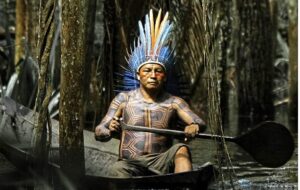The Letter sends Pope Francis message to a creation in crisis

Laudato Si’ week, named after Pope Francis’s ‘creation’ encyclical, aims to make us think about ways to care for Earth, our ‘common home’. The documentary The Letter highlights the issues around environmental change in an imaginative and thought-provoking way, says Down and Connor’s Ephata Laudato Si’ group.
 Laudato Si’ week has just begun, and a great way to remind ourselves of the key message of the first encyclical to focus entirely on care of Creation is to view the documentary film, The Letter.
Laudato Si’ week has just begun, and a great way to remind ourselves of the key message of the first encyclical to focus entirely on care of Creation is to view the documentary film, The Letter.
What is rare is wonderful – “An rud is annamh is iontach” – something highlighted very effectively by Nicolas Brown, the director of the movie.
The Letter tugs at our communal hearts. Personal letters are becoming rare, with ephemeral emails and texts taking their place. Rarer still is an envelope with a Vatican postmark. So, you might ask, what is the thinking behind a movie that focuses on the 2015 encyclical Laudato Si’?
The Letter is a drama documentary which narrates the story of our Earth’s destruction; it is both a novel and very simple way of telling a profound truth.
Firstly, it serves as an incentive not to be discouraged about the pace of change in the eight years since the publication of Laudato Si’. On the positive side, many of us have become better informed as good custodians of creation, while for others it is a work in progress.
The hard-hitting encyclical is addressed to “every person living on this planet”. Although many have listened, too many have adopted the attitude, ‘Ah sure I will attend to it tomorrow’, or ‘This is not my affair’.
But Pope Francis, along with others, is adamant that the time to act is now. “The film is a clarion call to people everywhere – wake up, get serious,” says Cardinal Michael Czerny, the Vatican’s Prefect of the Dicastery for Promoting Integral Human Development.
One of the recipients of Pope Francis’s message in The Letter is Cacique Odair ‘Dadá’ Borari. He is a leader of the Novo Lugar community of the Borarí people. They reside in the Maró Indigenous Territory, located in present-day Pará, Brazil. The Maró lands include old-growth forests, teeming with life and beauty, which have been plundered and stripped by logging companies. As illegal loggers began to increase their incursions into the Maró Territory, Cacique Dadá became expert in the use of a new technique to capture GPS-tagged photographs of their activities. His work created evidence of the loggers’ crimes, forcing government authorities to take action. As a result of his courageous leadership, Cacique Dadá was captured and tortured by mercenaries, and must now travel with a security escort. After filming was completed, Cacique Dadá continued advocating for the protection of his people and land. He is now the leader of a healthcare initiative for several indigenous peoples, bringing multiple perspectives together under a common need for indigenous dignity, and he is training the next generation of leaders to protect the land.
In his pontificate, Pope Francis has promoted a culture of encounter. The movie depicts four letters arriving to individuals of diverse cultural backgrounds and geographical location – in India, Senegal, Hawaii and the Brazilian Amazon – who represent the life experience of youth, those living in poverty, the indigenous and those deploying science to save nature.
Each recipient of the papal letter is surprised and overawed to receive a personal letter of invitation to the Vatican. Each relates their own story of how climate change has impacted their lives and their communities – a very effective way to tell the story of Laudato Si’.
The use of four very different life stories to capture the impact of the dilemma is powerful; it’s a reminder that a story is more likely to evangelise than doctrine or theology. Relating real life stories is powerful; it opens our eyes to a sense of the world we may know nothing about or choose to ignore.
Moreover, Pope Francis puts his own teaching in Laudato Si’ into practice, by modelling it. He does not interview the protagonists – they have a rare and exclusive dialogue with him.
He recognises that each one has a lived experience not possible to him. Attentive listening to each invitee, exemplifies a true integral/ecological approach in an attempt to hear the cry of the earth with the cry of the poorest people on our planet today.
Pope Francis recognises the value of dialogue between various voices to call for a change of heart in how we are treating our common home.
The Letter is a first – no previous Pope has engaged in a documentary in this manner. The style of the narrative is not preachy but subtly encourages us to modify our behaviour, not in a frightening way but in a hopeful and positive manner.
In caring for our common home, we must find our own way. Not everyone needs to take the same action or cause deprivation in their lives. What is needed are small actions, as Pope Francis says: “Drops of water when they come together can make a reservoir.”
During 2023 Laudato Si’ week, which runs until May 28, can we make the plight of creation urgent and more prominent? Can we, blessed with education and faith, do anything to prevent such disasters and rebuild a better world for everyone on this our shared planet – our common home?
Ephata Laudato Si’ was founded in May 2020 as a Catholic faith group who are inspired and challenged by Laudato Si’. The group’s shared mission is to promote Pope Francis’s key messages and to witness to his seminal teaching on the members’ personal faith journeys.

One of the recipients of Pope Francis’s message in The Letter is Cacique Odair ‘Dadá’ Borari. He is a leader of the Novo Lugar community of the Borarí people
Anna Byrne DC

Illegal mining is causing deforestation and river pollution in the Amazon rainforest in Pará, Brazil – another way humans are damaging the environment
